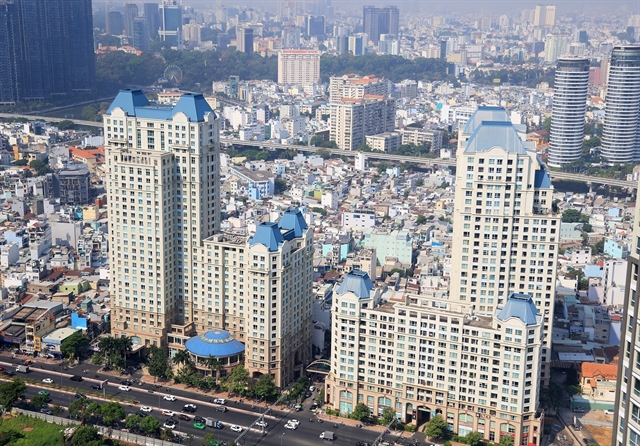 Economy
Economy

 |
| Apartment blocks in HCM City. Credit was made readily accessible to building contractors and suppliers to improve liquidity in the realty sector. — VNA/VNS Photo Hồng Đạt |
HÀ NỘI — The State Bank of Vietnam (SBV) has cut rates four times this year, but the end to the economic downturn is still not in sight, according to Deputy Prime Minister Lê Minh Khái.
The Deputy PM made the remarks at a conference on issues affecting credit on Monday.
Khái said capital holds the key to economic recovery. However, the current situation of the capital market had become a matter of concern as the credit crunch was upsetting the delicate balance of supply and demand.
By June 8, credit to the economy grew by merely 3.15 per cent year-on-year, far lower than the annual target of around 14 to 15 per cent. These figures offer a hint of low credit absorption capacity among borrowers across the board.
The Deputy PM urged SBV and other relevant public agencies to get legal obstacles out of the way to improve firms' access to credit.
"It would ruin their chance of recovery if firms with solid business plans and the ability to repay cannot access credit," said Khái.
He also called on SBV to take a more supportive stance on policy rates to boost their recovery as high lending rates would discourage credit demand from potential borrowers.
The Deputy PM also underlined the role of commercial banks as credit intermediaries in the financial market. He urged commercial banks to come to firms' assistance when they are in need of credit.
SBV Deputy Governor Đào Minh Tú said the first five months of the year were a hard time for the central bank as the economy was hard hit by unfavourable factors.
In the face of the situation, SVB had never thought of tightening credit. On the contrary, raising capital for the economy was always on top of its agenda.
"Under no circumstances were commercial banks allowed to refuse to accept deposits," said Tú.
The Deputy Governor also underlined measures SVB had taken to improve the situation.
For instance, SBV asked credit institutions to make loans in favour of real estate investors and homebuyers once they are eligible for the loans. Credit was also made readily accessible to construction contractors and suppliers to improve liquidity in the sector.
The central bank also restructured loans for some firms in difficulty, launched banks-firms business-matching programmes, organised seminars on credit access for small- and medium-sized enterprises, and offered loans with preferential rates to firms, households, and cooperatives. — VNS